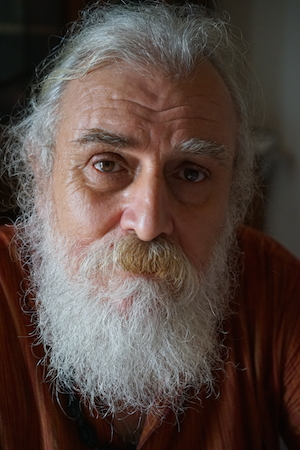Over the last two decades, the Muktabodha Indological Research Institute (MIRI) has created a vast online digital library, which is respected and utilized by scholars around the world. Over 2,600 manuscripts have been digitally preserved which, together with many searchable e-texts, are made freely available to Indologists, scholars of religion, and practitioners worldwide through the online Digital Library. Thus, MIRI provides the global community with an invaluable resource for research and study.
The Digital Library includes three distinct collections:
- The Searchable e-text Library
- The Paper Transcripts of the French Institute of Pondicherry (IFP)
- The Vedic Manuscript Collections of Gokarna
The Searchable E-text Library: This collection includes works of Śaiva literature from Kashmir and beyond, as well as texts of the Vīraśaiva, Pāñcarātra, Śrīvidyā, Śākta, and Nātha traditions. It also includes a growing selection of texts on Yoga.
The Paper Transcripts of the IFP: These include over 2,000 mostly Śaiva Siddhānta texts from the French Institute of Pondicherry, which have been designated by UNESCO as part of the ‘Memory of the World’ collection.
Vedic Manuscript Collections of Gokarna: This archive contains images of Vedic manuscripts from the private collections of the Joglekar, Kodlekere, and Samba Dikshita families from the temple town of Gokarna in Karnataka, India. These collections include texts from the Aśvalāyana school of Ṛgveda and from the Baudhāyana and Hiraṇyakeśin schools of the Taittirīya branch of Kṛṣṇayajurveda.
A more detailed description of each collection can be found on the Digital Library interface through the “Go to Library” tab above.
A Note on the Digital Library
The Digital Library webpages are undergoing a re-design. We shall, however, continue to keep the existing pages online in order to avoid any interruption in accessing the collections. Thank you for your patience.
Mr. Harry (Vasishtha) Spier
 The Board of Directors gratefully acknowledges the enormous contributions of Harry Spier, architect and founding manager of the Muktabodha Digital Library. In 2003, Mr. Spier created the original Muktabodha Digital Library collection by digitizing the texts and writing the website software for 75 volumes of the Kashmir Series of Texts and Studies.
The Board of Directors gratefully acknowledges the enormous contributions of Harry Spier, architect and founding manager of the Muktabodha Digital Library. In 2003, Mr. Spier created the original Muktabodha Digital Library collection by digitizing the texts and writing the website software for 75 volumes of the Kashmir Series of Texts and Studies.
Mr. Spier was Muktabodha’s project leader in the collaboration between the Muktabodha Indological Research Institute, and the Institut Français de Pondichéry (IFP; French Institute of Pondicherry) and École Française d’Extrême-Orient (EFEO-French School of Asian Studies). The outcome of this collaboration was the online publication of the catalogue and texts of the paper transcripts of the IFP Shaiva Manuscripts collection, consisting of more than 2,000 liturgical, theological and philosophical texts, mostly from the Śaiva Siddhānta tradition. Mr. Spier managed the digitization of the texts, which comprise more than 200,000 pages, and wrote the search engine and catalog software. This collection was added to the Muktabodha Digital Library in 2007.
In 2008, he created a sophisticated search engine and catalogue for the searchable e-text collection of Tantric texts.
In 2014, he created the Gokarna collection from previously digitized photographs owned by the Joglekar, Kodlekere, and Samba Dixita families, consisting of 238 mostly Āpastamba and Baudāyana manuscripts.
Mr. Spier was the managing editor for the Muktabodha publication Parāmārthasāra: The Essence of the Supreme Truth by Dr. Debabrata Sensharma. He also typeset the book and created the index for both this publication and the Īśvara-pratyabijñā-kārikā of Utpaladeva by Dr. B.N. Pandit, published by Muktabodha.
Mr. Spier retired from Muktabodha in 2017.
Dr. Mark S.G. Dyczkowski

Dr. Mark S.G. Dyczkowski served as Academic Advisor to Muktabodha’s Digital Library project from the end of 2004 until 2018. In that role, he was responsible for choosing the texts for the searchable e-text collection. Drawing on his lifetime of scholarship in this field, Dr. Dyczkowski carefully selected texts in ever expanding circles to create a library that gives an overview of the entire Tantric literature. This literature is crucially important to scholars seeking to understand the pervasive influence of Tantric practice on the development of Hindu worship. He also selected texts in specialized topics such as ‘Hindu ritual manuals’ and ‘worship of the goddess Kubjika’.
Furthermore, it was at the suggestion of Dr. Dyczkowski that Muktabodha first approached the French Institute of Pondicherry (IFP) to explore a potential collaboration. This ultimately resulted in the digitization of over 2,000 mostly Śaiva Siddhānta texts from the IFP collection that were added to Muktabodha’s Digital Library.
Equally significant was Dr. Dyczowski’s training of the team of typists who were responsible for the painstaking task of transcribing manuscripts into searchable e-texts, some of whom continue this work today. This involved teaching the typists to be able to read ancient scripts, such as Newari, and accurately transcribe them into the transliteration format used at the time for data entry. Through these and subsequent efforts, Muktabodha’s searchable e-text library is now the world’s largest searchable collection of Tantric literature.
We gratefully acknowledge the financial supporters whose generosity makes the work of the Muktabodha Institute possible. The Institute is funded primarily by individual donations, as well as the following additional sources:
1. The Muktabodha India Trust receives funding from corporate sponsors through the Corporate Social Responsibility (CSR) mandate of the Indian Companies Act of 2013.
a. CSR donations from Ace Hygiene Products Pvt Ltd are supporting a 3-year collaboration between the Muktabodha India Trust and the Institut Français de Pondichéry (IFP) to transcribe 75 Śaiva-siddhānta manuscripts from the IPF archives into searchable e-texts (for more details please visit https://muktabodha.org/75-saiva-texts-in-new-project-with-ifp-2/). As the transcriptions are completed the texts will be accessible online in the Muktabodha Digital Library e-text collection: https://muktalib7.com/DL_CATALOG_ROOT/digital_library_secure_entry.htm.
b. A CSR donation from ACE Hardware Private Ltd is supporting the transcription of 66 Shaiva Tantra manuscripts by the Muktabodha staff in Varanasi, Uttar Pradhesh, India. As the transcriptions are completed the texts will be accessible online in the Muktabodha Digital Library e-text collection: https://muktalib7.com/DL_CATALOG_ROOT/digital_library_secure_entry.htm .
2. A research grant from Stanford University to Dr. Elaine Fisher supported the transcription of a new collection of Vīraśaiva manuscripts in 2021-22 (for more details please visit https://muktabodha.org/new-virasaiva-collection-for-the-digital-library/). The manuscripts are accessible online in the Muktabodha Digital Library e-text collection, under the subject heading “Vīraśaiva”: https://muktalib7.com/DL_CATALOG_ROOT/digital_library_secure_entry.htm .

 The Board of Directors gratefully acknowledges the enormous contributions of Harry Spier, architect and founding manager of the Muktabodha Digital Library. In 2003, Mr. Spier created the original Muktabodha Digital Library collection by digitizing the texts and writing the website software for 75 volumes of the Kashmir Series of Texts and Studies.
The Board of Directors gratefully acknowledges the enormous contributions of Harry Spier, architect and founding manager of the Muktabodha Digital Library. In 2003, Mr. Spier created the original Muktabodha Digital Library collection by digitizing the texts and writing the website software for 75 volumes of the Kashmir Series of Texts and Studies.